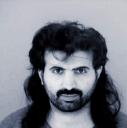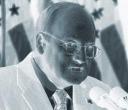Civil Liberties, Extraordinary Rendition, Guantanamo, Habeas Corpus, Human Rights, Military Tribunal, Targeting Muslims, Torture, Truth to Power

Ali al-Marri Update: Reversing the Bush Administration’s War on Terror Policy
In a reversal of the Bush Administration’s effort to detain people around the globe, last week, a federal appeals court in Virginia, which is a very conservative court ruled that the government cannot subject Ali Saleh Kahlah al-Marri to indefinite detention, though he was subject to indefinite detention by a 2003 presidential order.


A legal US resident – though not a citizen – al-Marri had studied computer science at Bradley University in Peoria, Illinois in 1991, and returned on 10 September 2001 to pursue post-graduate studies, bringing his family – his wife and five children – with him. Three months later he was arrested and charged with fraud and making false statements to the FBI, but in June 2003, a month before he was due to stand trial for these charges in a federal court in Peoria, the prosecution dropped the charges and informed the court that he was to be held as an “enemy combatant†instead.
As some listeners may recall, here on Law and Disorder we’ve discussed Ali al-Marri’s case and how he was held incommunicado, indefinitely in a military prison without charges. He’s been in solitary confinement for more than 2 years, no access to reading material, except the Qur’an. According to his lawyers, he was constantly harassed, abused and any medical treatment he received was very poor.
Now, because the U.S. Court of Appeals for the 4th Circuit ruled that U.S. residents cannot be locked up indefinitely as “enemy combatants†without being charged, al-Marri can challenge his detention. Al-Marri is the only “enemy combatant” still in detention without charge in the United States itself.

Guest – Jonathan Hafetz, Litigation Director of the Brennan Center’s Liberty and National Security Project and the lead counsel for Al-Marri. He is the author of numerous articles in scholarly and popular publications, including the Yale Law Journal, California Western Law Review, and Fordham Journal of International Law, Legal Affairs, and the New York Law Journal.
——


Off the Record: U.S. Responsibility for Enforced Disappearances in the War on Terror
Children as young as seven years old detained in secret CIA prisons are some of the startling details unearthed by a recent report drafted by six human rights groups including Amnesty International (PDF file), the Center for Constitutional Rights and the Center for Human Rights and Global Justice at the New York University School of Law.
The report titled Off the Record: U.S. Responsibility for Enforced Disappearances in the War on Terror, details aspects of the CIA detention program that the US government has actively tried to conceal, such as the locations where prisoners may have been held, the mistreatment they endured, and the countries to which they may have been transferred. The report names 39 people believed to be disappeared from countries such as Egypt, Kenya, Libya, Morocco, Pakistan, and Spain.

Guest – Meg Satterthwaite, director of the Center for Human Rights and Global Justice at the (NYU) Law School. Satterthwaite has published reports and articles on human rights topics in scholarly and advocacy contexts. Her research interests include human rights in the “war on terrorâ€; gender, sexuality and human rights; and the human rights of migrants. She is Co-Chair of the International Human Rights Interest Group of the American Society of International Law, a member of the Board of Directors of Amnesty International USA, and a member of the International Law Committee of the City Bar of New York.
Podcast: Play in new window | Download
Civil Liberties, Guantanamo, Military Tribunal, Supreme Court, Targeting Muslims, Torture, Truth to Power
Podcast: Play in new window | Download


Why Did Pulitzer Ignore Juan Gonzalez’s Reporting on Air Quality at Ground Zero?
Co-hosts Michael Ratner and Michael Smith commend the valuable investigative journalism by columnist and Democracy Now cohost, Juan Gonzalez. Gonzalez had written extensively about the air quality at Ground Zero after September 11th. Read more here. Here is an archive of Juan Gonzalez’s columns.
Co-hosts also discuss Supreme Court partial birth abortion ruling (PDF) and Michael Ratner‘s trip to Paris and the follow up on the case brought against former US Secretary of Defense Donald Rumsfeld in Germany.
—-


Drug Provision of the Higher Education Act
A coalition of groups including criminal justice, drug treatment, health organizations are seeking to repeal the Drug Provision of the Higher Education Act. It’s a 1998 law that delays or denies federal financial aid to people convicted of state or federal drug offenses. Since the law took effect in 2000, 200 thousand students have been denied financial aid. According to the Department of Education, that’s one in every 400 students rejected who apply for federal aid.
As a result, these young students, having already been punished for their offenses are now dropping out of school or reducing courses. Today, there are more than 300 organizations working to overturn this law.
Guest – David Borden, Executive Director of the Drug Reform Coordination Network. David’s been very active lately in lobbying to repeal the Drug Provision of the Higher Education Act (also known as the “Aid Elimination Penalty)
—-


Amnesty Report on Guantanamo Bay Prison Conditions
Earlier this month, Amnesty International released a report detailing the horrid prisoner conditions at Guantanamo Bay, Cuba. The report includes descriptions such as extreme isolation, sensory deprivation, solitary confinement 22 hours a day, and 24 hour lighting. Eighty per cent of the approximately 385 men currently held at Guantánamo are in isolation. Amnesty International also reports that the cells have no windows to the outside or access to natural light or fresh air.
Amnesty International is also calling on the government to allow independent health care professionals into Guantánamo to examine detainees in private and to allow visits by independent human right organizations and UN human rights experts.
Co-host and Amnesty International Director of the USA program, Dalia Hashad reads an excerpt from Bisher al-Rawi’s moving letter to free Guantanamo prisoners.
Guest – Shane Kadidal, an attorney with the Center for Constitutional Rights.
—-
Civil Liberties, Guantanamo, Military Tribunal, Surveillance, Torture, Truth to Power
Podcast: Play in new window | Download


Update:
- US Supreme Court Rejects Appeal (6-3 vote) From Guantanamo Detainees
- Co-hosts Michael Ratner and Michael Smith discuss the recent ruling by the Supreme Court to reject appeal from Guantanamo detainees who are challenging their five-year long confinement. Once again, Habeas Court is at stake. Michael Ratner says “If we had Habeas Corpus hearings, Guantanamo would be cleaned out in 24 hours.” Both co-hosts discuss what’s at stake as the US Supreme Court rolls back some 800 years, a fundamental pillar of justice. Habeas Corpus.
—-



Red Light For Stop Light Systems
Surveillance Creep: Across the United States, from Minnesota to Texas, a host of cities have installed automated systems to catch vehicles that run red lights. A photo is taken of the speeding car’s license plate and a citation is sent to the owner. Owners can contest it by showing that the car title had been transferred or by telling people the name of the person driving at the time. In Minneapolis, the police who manage the program said it issued 26,000 tickets in six months and reduced accidents by 16 percent at the intersections where cameras were posted.
But cities are finding problems with some of these devices. Lubbock, Texas for example has delayed installation of red light cameras after the discovery of shorter timed yellow lights. Also in Iowa. Residents felt this was an attempt to get more money…short yellows assure a steady flow of red light camera ticket revenue. And in Minneapolis, the program has reached its own red light. In mid-March the ACLU scored a victory in court, when a judge found the automated system, called Photo Cop, illegal. Photo Cop ticketed vehicle owners, not the drivers, which uniformity of Minnesota laws governing moving violations.
Guest – Howard Bass, a Burnsville attorney, he argued the case for the ACLU of Minnesota.
—-



Courts Relax Laws That Protect Expression of Free Speech From Police Spying
Unrestrained police surveillance has crept back into the lives of civilians at an alarming rate. Normally held in check by court settlements or consent decrees, city officials and courts are increasingly diluting the power of such agreements. A consent decree will help restrain overreaching law enforcement and permit the exercise of free speech.
In New York City, since 1986 police must follow consent decree guidelines when investigating individuals engaging in First Amendment activities. We may not have had these guidelines were it not for a lawsuit brought by Barbara Handschu Known as the Handschu Settlement, it was agreed to in 1980 by a plaintiff class numbering in the millions and the New York City Police Department.
Twenty-two years after the settlement was signed, the NYPD asked to modify it, saying it was too restrictive, and would inhibit terrorism investigation. U.S. District Court Judge Charles Haight agreed with the NYPD.and relaxed the guidelines.
And what’s happening in NY is also happening around the country.
Take Chicago for example. .In 2001 the 7th Circuit U.S. Court of Appeals stripped Chicago’s consent decree. It was signed 25 years ago. Now, city officials say it impedes investigations of gang activity. No longer are police deterred from spying on, or disrupting the constitutionally protected activities of political groups.
Historically, court settlements and consent decrees have held in check unfettered police abuse of First Amendment freedoms. But under the Bush administration, attorneys general have actually marginalized these important decrees. We’ve watched the Justice Department LIFT existing decrees, preferring to enter into less formal understandings with police. In so doing, the judicial branch of our government acts as a national conspirator with local police departments in violating our collective civil rights.
Guest – Paul Chevigny, law professor at New York University and one of the lawyers involved in NY’s historic Handschu lawsuit.
—-
Civil Liberties, Guantanamo, Military Tribunal, Surveillance, Truth to Power, Uncategorized
Podcast: Play in new window | Download

Update:
- Co-hosts Michael Ratner and Dalia Hashad discuss the key elements of the David Hicks military tribunal. They describe how two of the three lawyers representing were dismissed by the judge leaving attorney Major Michael Mori as counsel. David Hicks has become the first Guantanamo prisoner to plead guilty under the Military Commissions Act passed last year.
- Hosts describe the plea deal that was made with military prosecutors and Hick’s role training with the Taliban under the Pakistan Inter-Services Intelligence ISI.
—-


An International Witchhunt: Police Spy on Protestors Before RNC Convention in New York City
A national and international effort was launched by police and intelligence to spy on protesters before the Republican National Convention in 2004. According to the New York Times, teams of undercover officers were sent across the US, Canada and Europe to spy on groups and individuals planning to take part in the protests in New York. Specially trained officers part of the “RNC Intelligence Squad,” posed as activists as they targeted anti-war organizations, environmentalists and artists.
Guest – Donna Lieberman, Executive Director of the NYCLU
—-

Disorder in the Court: Great Fractured Moments in Courtroom History
Co-host Michael Ratner, reads from Disorder in the Court: Great Fractured Moments in Courtroom History These are what people actually said in court, word for word, taken down and now published by court reporters who had to keep a straight face while these exchanges took place. Get ready to laugh.
—-


2006 Study Shows Half A Million People Stopped on New York City Streets
Last year New York City police stopped more than 500 thousand people on city streets. 2006 statistics show a near doubling in the average number of arrests as a result.
Of those stopped last year a disproportionate 55 percent were black and 30 percent were Hispanic. As mentioned here at length on previous Law and Disorder programs, the NYPD continues to build a database on each street stop. A database with information most likely shared with intelligence agencies around the world.
——————————————————————–
- Click here to read the NYCLU’s letter and the NYPD order (PDF).
- Click here to read the NYCLU’s palm card “What to Do If You’re Stopped by the Police”.
Guest – New York civil liberties Executive Director Donna Lieberman.
Guest – Deborah Small, Executive Director of Break the Chains, an organization that seeks to build a national movement within communities of color against punitive drug policies.

















